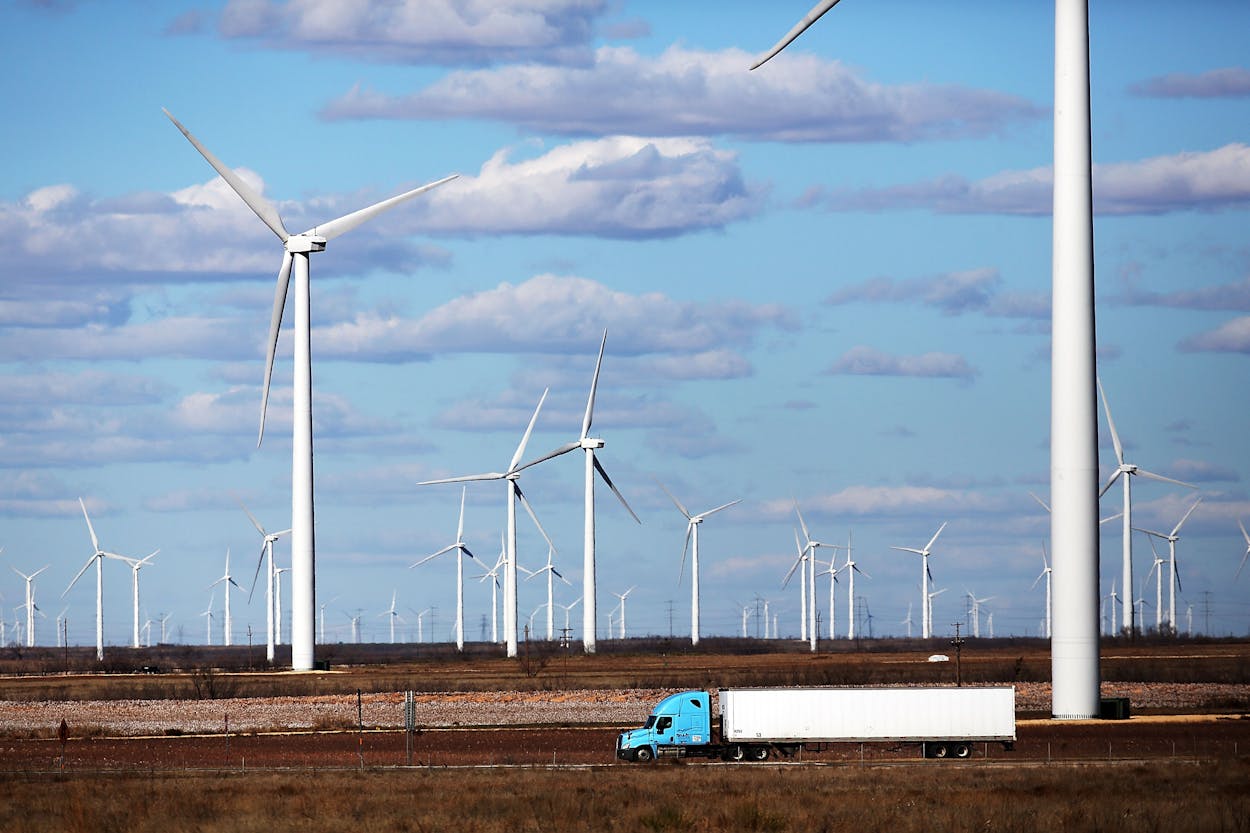Wind energy exceeds hydroelectric power thanks to Texas wind farms, Exxon settles a dispute in San Antonio, and a new refinery in South Texas signs a deal for geothermal energy. Here are a few of the biggest headlines in Texas energy this week.
Texas Wind Energy, the Gift That Keeps on Giving
According to new information from the U.S. Department of Energy and the American Wind Energy Association, wind power production exceeded hydroelectric power for the first time in 2016. Wind energy is now the number-one source of renewable energy in the country, producing 82,183 megawatts of electricity.
As the cost of wind energy production continues to fall, companies are investing more in wind farms across the country, especially in Texas. Texas produces 20,321 megawatts of electricity from wind energy. That’s one-quarter of the national total and triple the amount of any other state. There are 11,592 turbines across the state of Texas. That energy output is the equivalent of powering 5.7 million average homes. On average, Texans get about 13 percent of their power from wind energy.
On top of energy production, the growing wind energy market is creating a large number of jobs. The Department of Labor projected that “wind service technician” will be the nation’s fastest-growing occupation. The wind industry currently employs almost 102,000 workers.
This week in the Houston Chronicle op-ed section, the paper’s editorial board called on Texas politicians to embrace our growing source of renewable energy, not just for its environmental advantages, but its business ones. The board writes:
Companies like GM and Facebook are going out of their way to buy Texas wind. Even Dow Chemical uses wind to help power its chemical plants. The stable prices and low pollution are simply good for the bottom line and so are the 25,000 jobs wind has created in Texas.
Unlike coal or fracking, wind seems to be a less divisive source of energy, and geographically, red states contribute much of the nation’s wind power. Jeffrey Clark, president of the Wind Coalition, told the Dallas Morning News that “nearly 88 percent of wind capacity installed in 2016 was in states that voted for [President Donald] Trump.” The Department of Energy expects wind power to supply 20 percent of the nation’s electricity by 2030, with a large part of that coming from Texas wind farms.
Refinery Signs Up for Geothermal Power
Raven Petroleum, a company working to build an oil refinery in Duval County, signed a deal with Thermal Energy Partners, an Austin-based geothermal energy company that would power the refinery. While locals are skeptical about the effects the refinery might have on the local environment, the company hopes that the use of renewable geothermal energy would ease concerns about environmental effects. According to the Caller-Times, the plant would be capable of processing 50,000 barrels of light crude daily. It could also contribute to 1,500 construction jobs and 300 permanent jobs on the 200-acre facility. This South Texas Energy Complex would be the first large refinery built in the U.S. since the seventies.
Texas Representative Proposes State Regulated Fracking
On Tuesday, U.S. Representative Louie Gohmert introduced legislation that would give states authority over how they regulate hydraulic fracturing. This bill would accompany FRESH, or the Fracturing Regulations are Effective in State Hands Act, introduced by Senator Jim Inhofe, (R-Oklahoma) in 2015.
Both pieces of legislation are meant to combat regulation put in place by the Obama Administration. Gohmert argued:
States such as Texas have the intricate knowledge and first-hand expertise necessary to properly regulate this energy without the need for a federal, one-size-fits-all approach that has been destructive and costly to our nation’s energy interests. For these reasons, it is time to put people to work producing our own energy, which sends less money to countries that do not like us, all while lowering the cost of living. This is one of those bills that is good all the way around.
A Settlement in San Antonio
In 2013 Acilia Acosta, CEO and president of Carcon Industries & Construction, alleged that Exxon Mobil recruited her and other minorities to bid on the sale of 63 gas stations in the San Antonio and Austin areas. According to Acosta, the bids that took place in 2011 were a “charade,” since Exxon sold the stations to “Anglo businessmen.” Exxon Mobil disputed the allegations, and in November filings reported that Acosta’s bid was lower than the average of the three highest bidders by sixty percent. The San Antonio Express News reported that the case against Exxon was set to go to court this week, but an out-of-court settlement was made instead.
- More About:
- Energy
- Wind Power
- Fracking






